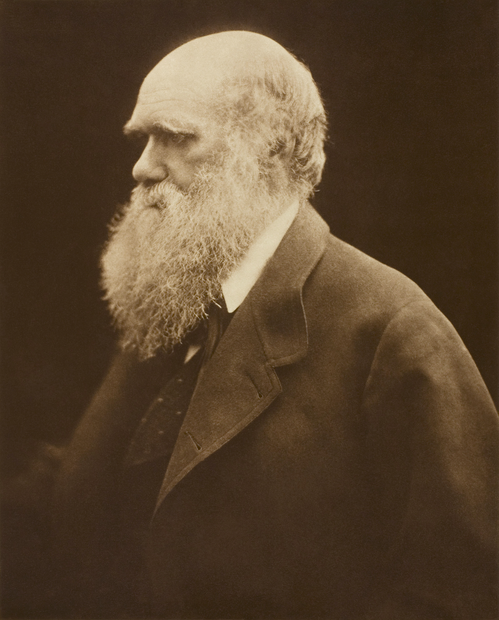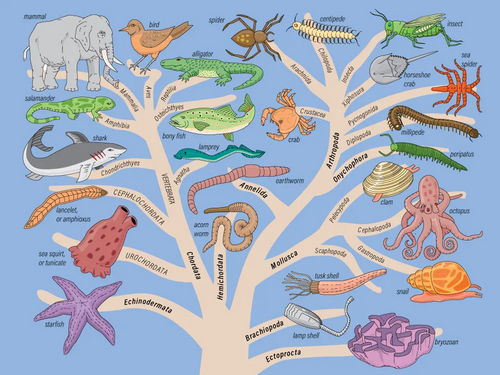The Bible Doesn't Believe in Darwinism

While Charles Darwin held a basic belief in the biblical Creator of the heavens and the earth, he did not believe in the Bible's account of the Creator's work.1
Darwin's fundamental claim is that the vast diversity of forms of plant and animal life are the result of purely natural processes involving accidental changes that happen to "catch on" in the reproduced forms of species. Given millions of years of such evolution, the theory holds, from some single celled form of life in the beginning, fish became reptiles became birds became apes became modern humans. Of course, the official version is not so simple regarding the transitions from one species to another.
Darwin's fundamental claim is that the vast diversity of forms of plant and animal life are the result of purely natural processes involving accidental changes that happen to "catch on" in the reproduced forms of species. Given millions of years of such evolution, the theory holds, from some single celled form of life in the beginning, fish became reptiles became birds became apes became modern humans. Of course, the official version is not so simple regarding the transitions from one species to another.
Importantly, such creative natural processes require no supernatural power. Whatever personal beliefs Darwin held about the Bible's God, those who zealously seized upon his theory from the first edition of Origin of Species were glad to find that Darwinian evolution provided an alternative to biblical creationism.
A century after that first edition, Wilbert H. Rusch of Concordia Teachers College wrote,
"[A]t the precise time when fear and dislike of God was on the increase [Darwin] happened to synthesize the previous evolution theories into a single presentation, clothing it in a hypothesis that seemed adequate to explain the marvelous adaptation of living things, by the mere action of natural forces, without the necessity of bringing in divine intervention."2
Modern science gladly continues to tell this story without reference to any powers or intentions beyond pure chance interactions among atoms in the universe. In Darwin's name, then, today's scientists and teachers of natural science perpetuate the disbelief in the Bible's story of how God created everything in--not since--the beginning.
The foundation of the biblical story is found in Genesis 1:27, "So God created man in his own image, in the image of God he created him; male and female he created them," (ESV). When Moses3 wrote "created," he used a word that he used in verse twenty-one regarding the beginning of all kinds of creatures that fill the waters and the skies. There, he wrote, "So God created the great sea creatures and every living creature that moves, with which the waters swarm, according to their kinds, and every winged bird according to its kind. And God saw that it was good," (ESV). This refers to verse twenty, where "God said, 'Let the waters swarm with swarms of living creatures, and let birds fly above the earth across the expanse of the heavens,'" (ESV).
A century after that first edition, Wilbert H. Rusch of Concordia Teachers College wrote,
"[A]t the precise time when fear and dislike of God was on the increase [Darwin] happened to synthesize the previous evolution theories into a single presentation, clothing it in a hypothesis that seemed adequate to explain the marvelous adaptation of living things, by the mere action of natural forces, without the necessity of bringing in divine intervention."2
Modern science gladly continues to tell this story without reference to any powers or intentions beyond pure chance interactions among atoms in the universe. In Darwin's name, then, today's scientists and teachers of natural science perpetuate the disbelief in the Bible's story of how God created everything in--not since--the beginning.
The foundation of the biblical story is found in Genesis 1:27, "So God created man in his own image, in the image of God he created him; male and female he created them," (ESV). When Moses3 wrote "created," he used a word that he used in verse twenty-one regarding the beginning of all kinds of creatures that fill the waters and the skies. There, he wrote, "So God created the great sea creatures and every living creature that moves, with which the waters swarm, according to their kinds, and every winged bird according to its kind. And God saw that it was good," (ESV). This refers to verse twenty, where "God said, 'Let the waters swarm with swarms of living creatures, and let birds fly above the earth across the expanse of the heavens,'" (ESV).
In other words, the biblical story gives the impression that at one moment the seas and the skies are empty of any form of life. The next moment they are full of every kind of animal that could still be identified in Moses's day. Likewise, in the case of the human kind, at one moment there are no humans, then in another moment there are two humans: male and female.
This understanding of the biblical story appears to be confirmed by Jesus and his apostle Paul in documents of the New Testament. In Mark 10:6 Jesus quotes Genesis 1:27 as a statement of historical fact. That is, that humankind was "male and female" "from the beginning." There is no sense of vast periods of evolution in which trial-and-error processes blindly stumbled upon the complementary way in which one human kind is composed of male and female genders of the species.
In a similar way, the apostle Paul affirms the Genesis record with regard to Adam and Eve. Paul points back to Genesis in such a way that affirms Adam and Eve as historical figures and as the first human beings. Further, Paul affirms Moses's testimony that Adam and Eve were created by God to be male and female. (See, for example, 1 Corinthians 11:8, 9; 15:45; 1 Timothy 2:13, 14.)
This biblical story of human origins has been perpetuated in the mainstream of Christian tradition ever since. For example, the Presbyterian tradition includes the Westminster Confession of Faith, produced in the mid-seventeenth century in England. While the Confession includes a number of things particular to the Presbyterian understanding of Christianity, it also includes a confession of a doctrine of creation consistent with Moses, Jesus, and Paul in the Bible. That Confession includes the following:
"It pleased God the Father, Son, and Holy Ghost, for the manifestation of the glory of His eternal power, wisdom, and goodness, in the beginning, to create, or make of nothing, the world, and all things therein, whether visible or invisible, in the space of six days, and all very good. After God had made all other creatures, He created man, male and female," (WCF 4:1-2).
We can see, then, that the traditional Christian teaching about human origins is that God made rather directly both male and female genders of humankind in that, in a very brief period, God made the first humans, whom we know as Adam and Eve. There is no suggestion that "created" or "made" involves long periods of accidental, trial-and-error processes merely superintended by God. What is represented in the Bible and affirmed by thousands of years of orthodox confession is that God determined from the first the various kinds of life there would be, and God made them from the very beginning in those kinds. This includes a kind of creature called "human," gendered male and female, and substantially the same as humans continue to be today.
This exposes the battle line between modern science and the Bible. Evolutionary theory offers an explanation for the entire observable universe that allegedly requires no supernatural power. The Bible, in contrast, gives no indication of any such thing as evolution by natural selection.
In other words, Darwinism does not believe in God, and the Bible does not believe in Darwinism.
This understanding of the biblical story appears to be confirmed by Jesus and his apostle Paul in documents of the New Testament. In Mark 10:6 Jesus quotes Genesis 1:27 as a statement of historical fact. That is, that humankind was "male and female" "from the beginning." There is no sense of vast periods of evolution in which trial-and-error processes blindly stumbled upon the complementary way in which one human kind is composed of male and female genders of the species.
In a similar way, the apostle Paul affirms the Genesis record with regard to Adam and Eve. Paul points back to Genesis in such a way that affirms Adam and Eve as historical figures and as the first human beings. Further, Paul affirms Moses's testimony that Adam and Eve were created by God to be male and female. (See, for example, 1 Corinthians 11:8, 9; 15:45; 1 Timothy 2:13, 14.)
This biblical story of human origins has been perpetuated in the mainstream of Christian tradition ever since. For example, the Presbyterian tradition includes the Westminster Confession of Faith, produced in the mid-seventeenth century in England. While the Confession includes a number of things particular to the Presbyterian understanding of Christianity, it also includes a confession of a doctrine of creation consistent with Moses, Jesus, and Paul in the Bible. That Confession includes the following:
"It pleased God the Father, Son, and Holy Ghost, for the manifestation of the glory of His eternal power, wisdom, and goodness, in the beginning, to create, or make of nothing, the world, and all things therein, whether visible or invisible, in the space of six days, and all very good. After God had made all other creatures, He created man, male and female," (WCF 4:1-2).
We can see, then, that the traditional Christian teaching about human origins is that God made rather directly both male and female genders of humankind in that, in a very brief period, God made the first humans, whom we know as Adam and Eve. There is no suggestion that "created" or "made" involves long periods of accidental, trial-and-error processes merely superintended by God. What is represented in the Bible and affirmed by thousands of years of orthodox confession is that God determined from the first the various kinds of life there would be, and God made them from the very beginning in those kinds. This includes a kind of creature called "human," gendered male and female, and substantially the same as humans continue to be today.
This exposes the battle line between modern science and the Bible. Evolutionary theory offers an explanation for the entire observable universe that allegedly requires no supernatural power. The Bible, in contrast, gives no indication of any such thing as evolution by natural selection.
In other words, Darwinism does not believe in God, and the Bible does not believe in Darwinism.
Notes
1 Wilibert H. Rusch, "Darwinism, Science, and the Bible," in Paul A. Zimmerman, ed., Darwin, Evolution, and Creation (Concordia Publishing House: Saint Louis, Missouri, 1959), 33.
2 Ibid., 22.
3 Moses is here credited as the author of Genesis, according to the main stream of Christian tradition historically. This does not ignore some indications that material originally written by Moses was to some extent edited so that the book of Genesis has the form we know of today.
1 Wilibert H. Rusch, "Darwinism, Science, and the Bible," in Paul A. Zimmerman, ed., Darwin, Evolution, and Creation (Concordia Publishing House: Saint Louis, Missouri, 1959), 33.
2 Ibid., 22.
3 Moses is here credited as the author of Genesis, according to the main stream of Christian tradition historically. This does not ignore some indications that material originally written by Moses was to some extent edited so that the book of Genesis has the form we know of today.



No Comments